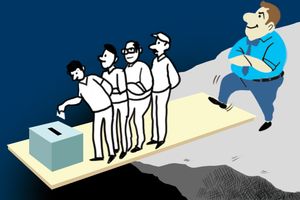Winston Churchill famously said, “Democracy is the worst form of government except for all those other forms that have been tried.” But, over the years, democracies have absorbed many sins of autocracies, theocracies, aristocracies and gerontocracies. Experts say democratic backsliding today begins at the ballot box with voters electing corrupt, divisive and authoritarian leaders. Their governments may then implement racist, undemocratic, uneconomic and unethical policies. Nearly two centuries ago, French historian Alexis de Tocqueville warned that, “Tyranny of the majority” endangers democracy. Today democracy seems torn by the tyranny of the majority and minority—that even fuels war.
Israeli Prime Minister Benjamin Netanyahu ignores global outrage and pleas from the US, bolstered by his two fringe, extremist, ultranationalist coalition partners—religious Zionism Party’s Bezalel Smotrich, the finance minister, and Jewish Power Party’s Itamar Ben-Gvir, the national security minister. They have publicly threatened to withdraw support if Netanyahu backs down. “Netanyahu in 2024 is far more afraid of Ben-Gvir than he is of Joe Biden. The Israeli government is the Ben-Gvir government, at the expense of all of us,” mourns Israeli commentator Ben Caspit.
Jewish hardliners refuse emergency food and medical supplies to starving, injured Palestinian children. The loudest protestors blocking aid are women ultranationalists. In their book, Tyranny of the Minority, focusing on the US, Harvard political scientists Steven Levitsky and Daniel Ziblatt assert, “Minorities of all kinds have become the decision-makers; they dominate, tyrannise or terrorise.” The tyranny of the elite minority in democracies is overtaken by the atomised tyrannies of outliers, populists, conspiracy-theorists and demagogues.
The biggest demagogue that democracy has thrown up in recent times is Donald Trump. Even Europe is wary. Quoting a German parliamentarian, prominent historian Anne Applebaum said, “Europe may face a world in which we are competing with three autocracies—China, Russia and the US. The fear is that the second Trump administration will be aggressive. He has no government job, but controls a minority in the US Congress and dictates US policy.”
Europe is shell-shocked that this year’s elections in the big democracies could bring leaders who are well-disposed to their enemy, Vladimir Putin. Trump is a Putin-admirer, describing him as a “genius—strong and smart”. Narendra Modi is friendly with Putin. Indonesian leader Prabowo Subianto is a Putin fan. Kornelius Purba, managing editor of The Jakarta Post, noted that many Indonesian voters support General Prabowo “because they are fanatical fans of President Putin”. Indonesian liberals fear Prabowo will rule like a Putin-style strongman.
In Britain, Prime Minister Rishi Sunak turns to rightwing populism to lure fleeing voters. He is under pressure from his minority of Tory “English nationalists” who threaten to topple him unless he tightens immigration, slows climate goals and lowers taxes. Economists agree these are bad policies for recession-mired Britain and for Tories; general voters want solutions to their crushing problems. Identifying democracy’s flaw, European leader Jean-Claude Juncker remarked, “We all know what to do, but we don’t know how to get re-elected once we have done it.”
Germany’s current polarised, fragmented political landscape is “frighteningly similar to the 1930s” that gave rise to Hitler, warns German pollster Forsa Institute. The post-war law mandating parties to secure at least 5 per cent share of votes to enter parliament, kept extremist, peripheral groups out. Disillusioned by mainstream parties, voters are now flocking to radical movements. Polls show one in five Germans would vote for a fringe party. An exasperated Winston Churchill once quipped, “The best argument against democracy is a five-minute conversation with the average voter.”
Pratap is an author and journalist.


